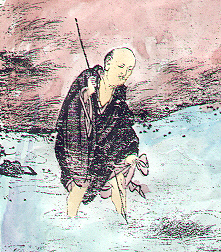Case 48 never ends, yet now comes ...
Case 49: Tozan Offers to the Essence
As we have been discussing on another thread this week ...
... "Just This" does not mean "just only this".
And when it comes to "Just This", "Not Knowing" does not mean "simply not having a clue". "Not Knowing" is profound "Knowing", but not in the ordinary way. Thus Tozan speaks what need not and cannot be spoken, and is heard loud and clear.
As Katagiri Roshi once said, "Ya gotta say something".
Returning from Ungan's place (can we even speak of "going" and "returning"?), Tozan looked in a mirror-like mountain stream and saw his own reflection. A "reflection" requires two, yet in this mirror there is one or (to be specific) "not one, not two". He realized that "finding" one's True Face is not a matter of looking someplace distant, or even searching at all. He wrote this poem (here are two translations I found, also not one not two) ...
Non-seeking, thus Finding Everywhere. Where does the mirror look to find the mirror? So, where should you look to find you?
Later, Tozan was asked, "What instruction did you receive at your late master's place?" Tozan said, "Although I was there, I didn't receive his instruction". What is there to give, what is there to receive? Obviously, Tozan received the Treasure that cannot be given!
Question - What do you receive from a Koan such as this?
Gassho, J
12th Century Drawing of Tozan crossing the stream, seeing his reflection ...

ReMINDer - Our next book in the Treeleaf "Beyond Words & Letters" Book Club will be Inside the Grass Hut: Living Shitou's Classic Zen Poem by Ben Connelly ... beginning in a few short weeks ...
Case 49: Tozan Offers to the Essence
As we have been discussing on another thread this week ...
... "Just This" does not mean "just only this".
And when it comes to "Just This", "Not Knowing" does not mean "simply not having a clue". "Not Knowing" is profound "Knowing", but not in the ordinary way. Thus Tozan speaks what need not and cannot be spoken, and is heard loud and clear.
As Katagiri Roshi once said, "Ya gotta say something".
Returning from Ungan's place (can we even speak of "going" and "returning"?), Tozan looked in a mirror-like mountain stream and saw his own reflection. A "reflection" requires two, yet in this mirror there is one or (to be specific) "not one, not two". He realized that "finding" one's True Face is not a matter of looking someplace distant, or even searching at all. He wrote this poem (here are two translations I found, also not one not two) ...
Do not seek him as an object. The object you seek will not be you.
As I proceed, at one with myself, I meet him everywhere I go.
He is what I am, yet I am not him.
If your understanding reaches here you have your true way.
Here's another translation:
Do not seek him anywhere or he will run away from you.
Now that I go on all alone, I meet him everywhere.
He is even now what I am, I am even now not what he is.
Only by understanding this way can there be a true union of the self.
As I proceed, at one with myself, I meet him everywhere I go.
He is what I am, yet I am not him.
If your understanding reaches here you have your true way.
Here's another translation:
Do not seek him anywhere or he will run away from you.
Now that I go on all alone, I meet him everywhere.
He is even now what I am, I am even now not what he is.
Only by understanding this way can there be a true union of the self.
Later, Tozan was asked, "What instruction did you receive at your late master's place?" Tozan said, "Although I was there, I didn't receive his instruction". What is there to give, what is there to receive? Obviously, Tozan received the Treasure that cannot be given!
Question - What do you receive from a Koan such as this?
Gassho, J
12th Century Drawing of Tozan crossing the stream, seeing his reflection ...

ReMINDer - Our next book in the Treeleaf "Beyond Words & Letters" Book Club will be Inside the Grass Hut: Living Shitou's Classic Zen Poem by Ben Connelly ... beginning in a few short weeks ...





Comment